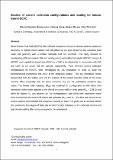Studies of current collection configurations and sealing for tubular hybrid-DCFC
Date
02/11/2016Metadata
Show full item recordAbstract
Direct Carbon Fuel Cells (DCFC) offer efficient conversion of coal or biomass derived carbons to electricity. A Hybrid Direct Carbon Fuel Cell (HDCFC) is a type of DCFCs that combines solid oxide cell geometry with a molten carbonate fuel cell electrode. This study focused on investigating different current collection configurations and sealant for tubular HDCFC concept. A HDCFC used a gadolinia doped ceria (GDC) or a YSZ as the electrolyte, in composites with NiO and LSM as the anode and the cathode, respectively. Three different current collection configurations of HDCFC were investigated by AC impedance in order to study the electrochemical phenomena that occur at the electrodes surface. The AC impedance results showed that both the surface area and the position of the current collector inside of the anode chamber affect drastically both the series resistance (Rs) and the polarisation resistance (Rp) values. The lowest total resistance (Rtot) was achieved on Configuration b with silver wire interwoven nickel mesh attached to the side of the anode wall by silver paste (Rtot = 2.98 Ω) and while the highest Rtot was achieved on the configuration c with silver wire interwoven nickel mesh inserted into the mixture of carbon and carbonate (Rtot = 149 Ω). The leak test carried out on several sealants demonstrated that composite sealants of Toku P-24 paste and an alumina silicate disc produced a low degree of leaks due to both the high resistance to the carbonate mixture and high density sealing after curing compared to the ceramabond.
Citation
Bonaccorso , A D , Jiang , C , Ma , J & Irvine , J T S 2016 , ' Studies of current collection configurations and sealing for tubular hybrid-DCFC ' , International Journal of Hydrogen Energy , vol. 41 , no. 41 , pp. 18788-18796 . https://doi.org/10.1016/j.ijhydene.2016.01.115
Publication
International Journal of Hydrogen Energy
Status
Peer reviewed
ISSN
0360-3199Type
Journal article
Collections
Items in the St Andrews Research Repository are protected by copyright, with all rights reserved, unless otherwise indicated.

